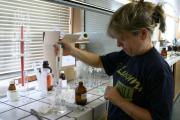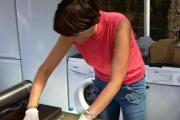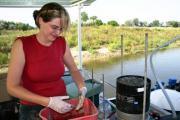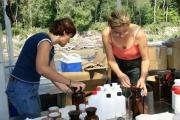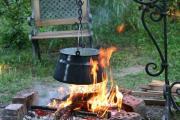
The "Chemical Trio" -- Carmen Hamchevici and Mary Craciun from Romania, and Hana Hudcova from the Czech Republic - probably appreciated the late wake-up most as their day-to-day workload usually forces them to stay in the Argus ship's laboratory until midnight. The reason is that, next to processing all of the water, sediment and suspended solid samples to be sent for chemical and isotope analyses at on-land laboratories, they also have to carry out many on-board analyses. This includes entering results into databases, sending data to the JDS2 website and preparing sampling containers for the next day. Considering only the chemical analyses required at one sampling site, more than 20 different bottles, flasks and vessels are needed and they all have to be carefully prepared and labelled. Otherwise, any mistake could lead to destroying the whole sample. In the end, even such a simple looking activity is actually quite time-consuming and requires the full attention of the dedicated chemists.
Fortunately, some other team members have been lending a hand to the "Chemical Trio". Serbian biologist Momir Paunovic has been helping with some heavy work, operating the continuous-flow centrifuge. And Matus Haviar from the Slovak national team supported the sediment sieving.
By the end of the day, the ships proceeded to the Ujpest harbour, and the JDS2 Core Team spent a warm evening at the house of Team Leader Béla Csányi -- enjoying a genuine home-made Hungarian cauldron (bogrács) of bean goulash.













